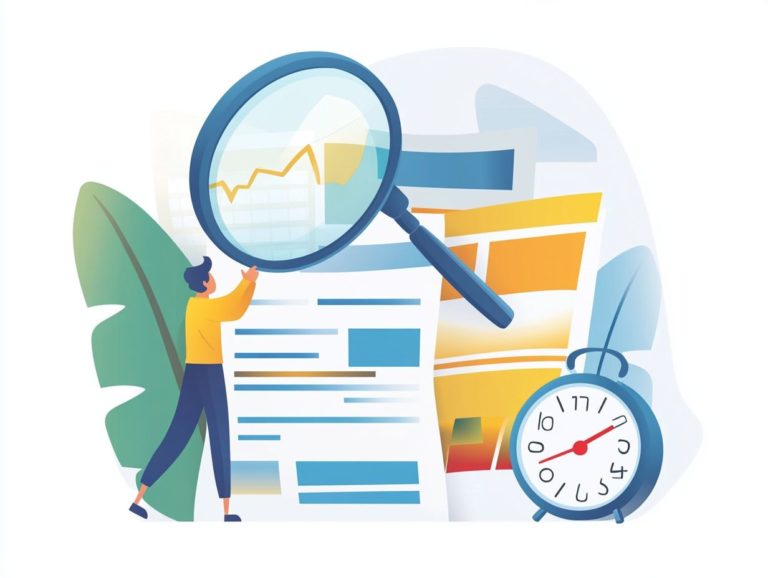5 Misunderstandings About Credit Scores
Navigating the world of credit scores can indeed be a challenge, particularly with a plethora of misconceptions swirling around. This article reveals five common myths about credit scores that might surprise you!
While a high credit score is often viewed as a hallmark of financial security, there s a deeper narrative at play. By grasping these myths, you ll be empowered to take charge of your financial future and uphold a robust credit profile.
Are you prepared to delve deeper? Let s dive in!
Contents
- Key Takeaways:
- 1. A High Credit Score Means You Are Financially Secure
- 2. Checking Your Credit Score Can Lower It
- 3. Closing Unused Credit Cards Will Improve Your Score
- 4. Your Income Affects Your Credit Score
- 5. Paying Off Debt Will Immediately Improve Your Score
- What Is a Credit Score and How Is It Calculated?
- Frequently Asked Questions
- 1. What are the common misunderstandings about credit scores?
- 2. Does having a lot of credit cards increase your credit score?
- 3. Is it true that checking your credit score can lower it?
- 4. Are all credit scores the same?
- 5. Can you improve your credit score quickly?
- 6. Will paying off all your debt improve your credit score?
Key Takeaways:

- A high credit score doesn’t guarantee financial security; income and debt matter too.
- Checking your credit score does not lower it. In fact, monitoring your score can help you catch errors and improve it over time.
- Closing unused credit cards can actually hurt your score. It’s better to keep them open and use them occasionally to maintain a longer credit history.
1. A High Credit Score Means You Are Financially Secure
A high credit score serves as a hallmark of financial security, granting you better access to credit and better interest rates on mortgages and auto loans, which are vital for achieving your long-term financial goals.
Credit scoring models, such as FICO and VantageScore, evaluate your creditworthiness. Understanding these scoring models is imperative, as they can profoundly influence various aspects of your financial health, including loan approvals and credit products offered by institutions like Capital One.
A solid credit score can lead to lower monthly payments, making large purchases more manageable and easing the strain on your monthly budget. In contrast, a lower score can lead to higher interest rates, making loans increasingly expensive over time.
For anyone striving for financial security, maintaining a good credit score is essential. It opens the door to more favorable financing options and promotes long-term financial well-being.
2. Checking Your Credit Score Can Lower It
Many consumers might think that checking their credit score is a harmless endeavor, but the truth is that it can have negative repercussions depending on the type of inquiry made. Soft inquiries, for instance, won t affect your score, but hard inquiries those pesky ones from credit applications can significantly lower it.
It s essential for you to grasp the distinction between these two types of inquiries, especially if you re eyeing loans or credit cards. Soft inquiries often occur when you check your own credit or when companies perform background checks. They provide a non-intrusive way for you to monitor your credit health without any repercussions.
On the other hand, hard inquiries arise when a lender reviews your credit report to make lending decisions. If you accumulate multiple hard inquiries in a short span, it could signal financial distress, which may drive your credit score down. By understanding these differences, you can make informed decisions about when to check your credit and how to manage your financial health in a proactive manner.
3. Closing Unused Credit Cards Will Improve Your Score
While many believe that closing unused credit cards is a smart move, it can actually backfire and harm your credit score. By closing a card, you increase your credit utilization ratio, which is the percentage of your available credit that you are using, and reduce your overall credit limit.
It’s essential to maintain an adequate number of active credit accounts to showcase responsible credit behavior. When you close a card, you not only reduce your available credit but also inadvertently raise the percentage of credit you’re using relative to your total limits. This ratio plays a significant role in determining your credit score.
To effectively manage unused cards, consider keeping them open and making small purchases to maintain activity, which helps preserve your credit utilization at a healthy level. Paying off these small purchases promptly ensures that you don t incur any debt, ultimately fostering better credit management and enhancing your overall financial stability.
Start monitoring your credit today and take control of your financial future!
4. Your Income Affects Your Credit Score

Your income is a key player in shaping your financial habits and has a significant impact on your credit score. It influences your ability to make on-time payments and manage debt effectively.
If you have a higher income, you ll likely find it easier to meet your financial obligations and ensure timely payments on loans and credit cards. This financial stability enhances your creditworthiness and contributes to a robust credit score over time.
On the flip side, if your income is limited, you may face challenges in keeping up with bills. This can lead to late payments and mounting debt. Establishing responsible financial habits, like budgeting and saving, becomes crucial, regardless of your income level.
By prioritizing on-time payments, you can significantly improve your credit health, even with modest earnings. This opens the door to better financial opportunities in the future.
5. Paying Off Debt Will Immediately Improve Your Score
Paying off debt can instantly enhance your credit score by lowering your credit card balance and improving your credit utilization how much credit you are using compared to your total credit limit.
When your credit utilization drops below 30%, you re likely to notice a significant uptick in your score. Lenders see lower credit utilization as a hallmark of responsible credit management, indicating financial stability.
By effectively managing your debt, you not only boost your creditworthiness but also open doors for future borrowing opportunities, whether it s for a home or a car loan. Embracing sound debt management practices can help stabilize and elevate your credit scores, leading to more favorable interest rates and lending terms.
What Is a Credit Score and How Is It Calculated?
A credit score is your three-digit ticket to understanding your creditworthiness, calculated from information gathered by credit bureaus like Experian, Equifax, and TransUnion. This score is based on a variety of factors, including your payment history, credit utilization, and the length of your credit history.
Outstanding debt and the variety of credit types you hold, such as revolving accounts like credit cards and installment loans like mortgages, play vital roles in shaping your score. Understanding these metrics empowers you to take actionable steps to improve your credit standing.
Remember, understanding your credit score can be a game changer! While FICO scores range from 300 to 850, VantageScore uses a slightly different scale for evaluating creditworthiness. You can conveniently access your scores through various services to monitor your credit health.
Act now to boost your score and unlock better financial opportunities by making timely payments and reducing your debt-to-credit ratio.
How Can a Low Credit Score Affect You?
A low credit score can significantly impede your financial journey, leading to higher interest rates on mortgages and auto loans, limited access to credit, and obstacles in reaching your long-term financial objectives.
This scenario can create a daunting cycle where you struggle to secure favorable terms on essential loans, further deepening your financial instability. Lenders often view a low score as a warning sign. This can lead to application denials or strict terms.
It can also affect rental agreements and insurance premiums, compounding the stress associated with financial management. Understanding the factors that influence your credit score is crucial.
By taking proactive steps to enhance it, you can unlock doors to better interest rates, easier access to credit, and ultimately pave a clearer path toward achieving your financial aspirations.
What Factors Can Negatively Affect Your Credit Score?

Several factors can significantly impact your credit score, including missed or late payments, high credit utilization, errors in your credit history, and the threat of identity theft. These factors can undermine your financial well-being.
The consequences of these issues can be extensive, often resulting in higher interest rates on loans or challenges in securing loans altogether. For instance, consistently making late payments can mar an otherwise pristine credit record.
A high credit utilization ratio essentially, the amount of credit you use compared to what you have available may signal to lenders that you re overly dependent on credit.
Inaccuracies in your credit report, stemming from clerical errors or outdated information, can further erode your score. To mitigate potential damage, it s crucial to adopt proactive strategies. Set reminders for payments, keep your credit utilization low, and review your credit reports for discrepancies.
Protecting your personal information is vital. Promptly report any suspicious activities to shield yourself from the adverse effects of identity theft.
How Can You Improve Your Credit Score?
Want to boost your credit score? Improving it is entirely within your reach through various effective strategies. Focus on paying off debt, keeping your credit utilization low, and practicing responsible credit use.
If you need tailored guidance, seeking credit counseling can provide personalized support. Making on-time payments should be a top priority as this significantly impacts your credit score.
Regularly reviewing your credit reports helps you spot errors, allowing you to dispute them promptly. Limit new credit inquiries and avoid closing old accounts to preserve the length of your credit history.
By adopting these actionable steps, you ll lay the foundation for a healthier financial future and empower yourself throughout your credit journey.
Start implementing these strategies today and watch your credit score soar!
What Are Some Common Myths About Credit Scores?
Myths surrounding credit scores often lead consumers astray. Many believe that checking your credit score will somehow hurt it or that closing accounts will magically improve it. Understanding the myths about credit scores is essential for making informed financial decisions.
Many individuals mistakenly think that simply having a credit card is sufficient to boost their score. The real game-changer is how they manage it. Paying bills on time and keeping credit utilization low are crucial factors that significantly influence that all-important number.
For example, closing an older credit account might unintentionally lower your score by shortening your overall credit history. By addressing these misconceptions, consumers can take proactive steps to enhance their credit health.
How Can You Maintain a Good Credit Score?
Maintaining a strong credit score demands consistent on-time payments and astute management of credit utilization. Regularly review your credit reports to ensure accuracy.
Develop a budget that prioritizes prompt bill payments. Leverage automated payments to avoid late fees. Keeping your credit card balances low in relation to their limits significantly improves your credit utilization ratio, which is crucial in credit scoring.
It’s also important to regularly check your credit reports for any inaccuracies or unfamiliar accounts. By reviewing your reports, you can quickly spot signs of identity theft.
By integrating these best practices, you can protect your credit score and lay a solid financial foundation for your future endeavors.
Frequently Asked Questions

1. What are the common misunderstandings about credit scores?
Many people think having many credit cards will improve their score. Others worry that checking their score will lower it, or assume all credit scores are the same.
2. Does having a lot of credit cards increase your credit score?
No, having many credit cards can actually lower your credit score. Too much available credit makes you seem riskier to lenders.
3. Is it true that checking your credit score can lower it?
Checking your own credit score is a soft inquiry and won t affect it. But when a lender checks your score, that s a hard inquiry, which can slightly lower it.
4. Are all credit scores the same?
No, not all credit scores are the same. Different lenders use various scoring models, and you might have different scores from each of the three main credit bureaus: Experian, Equifax, and TransUnion.
5. Can you improve your credit score quickly?
No, improving your credit score takes time and responsible behavior. Be cautious of companies promising quick fixes or overnight improvements.
6. Will paying off all your debt improve your credit score?
Yes, paying off your debt can boost your credit score! However, remember that credit utilization and payment history also play significant roles.






